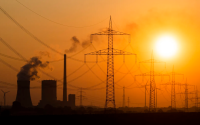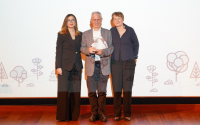7 May 2007Climate Ark
Caption: Greenhouse gas emissions threaten to destroy our atmosphere and biosphere
More than 1,000 government delegates are now meeting in Bonn to try to break gridlock in international climate change negotiations amid widening public concern and widely evident global warming impacts. This is the first time government climate delegations have met since the U.N. sponsored Intergovernmental Panel on Climate Change (IPCC) issued a spate of reports this year, drawing on the studies of some 2,500 scientists, which predict grim consequences of global warming if swift action is not taken. These climate change policy-makers must be challenged to develop a strengthened Kyoto regime as soon as possible that transitions the world to low carbon societies.This year's first IPCC report found global warming is almost certainly human caused and the second warned of the consequences already occurring and yet to come such as massive human death and disease, droughts, floods, and storms. The third report said fighting global warming would not undermine the world economy, and would be less costly if started now. Foremost, solutions were said to require greater use of renewable energy and setting a price on carbon to drive up the cost of using fossil fuels. Other key recommendations include not waiting for new technologies and proceeding immediately with policies such as shifting away from coal, embracing energy efficiency, reducing deforestation, implementing fuel taxes and strengthening Kyoto's binding emission limits.Current Bonn talks are preparing for a meeting of environment ministers in Bali, Indonesia, in December. It is essential formal negotiations are launched in Bali to widen and strengthen the U.N.'s Kyoto Protocol as soon as possible, and certainly before the current Kyoto agreement expires in 2012. A new more comprehensive and aggressive international climate change policy must be developed that is sufficient to keep warming within relatively safe parameters. First and foremost, Kyoto's framework for cutting greenhouse emissions must be accelerated and expanded, minimally along the lines of already adopted EU policy to cut carbon gases by 20 percent by 2020, compared to 1990 levels (30 percent if other major polluters follow suit). The longer term goal must be to cut greenhouse gas emissions by at least 80% by 2050 or earlier.There are several other essential components of any fast tracked post-Kyoto agreement including:1.) Mandatory aggressive targets for emission cuts by all developed nations, and developing countries with large and growing industrial emissions;2.) Poor non-industrial developing countries must be provided money and expertise to help adapt to catastrophic effects of global warming, and provided incentives to voluntarily cut emissions;3.) New coal burning power plants that do not sequester their carbon must be banned, and a binding schedule set to phase out existing coal power plants;4.) In order to halt and reverse loss of primary and old-growth forests, payments must to made to naturally forested countries to avoid deforestation and diminishment of these ancient forests;5.) Biofuels derived from clearance of primary rainforests, so called "deforestation biofuels", must not be supported by Kyoto funds nor count as carbon cuts;6.) Establishment of an international carbon market and carbon tax regime; and7.) International and national programs must be developed to promote reductions in consumption and movement towards sustainable individual and societal lifestyles.With the strengthened science, evident climate impacts now, and the rapidity of their advancement; negotiations must commence immediately, or at the latest in Bali in December, for a strengthened and expanded Kyoto system to reduce greenhouse gas emissions. This can not wait until 2012 when the present Kyoto protocol expires. As was done to successfully address the ozone hole under the Montreal Protocol, timetables must be advanced and mandatory participation in emission cuts expanded if the world is not to burn. Note this alert is going to over 200 recipients, some of whom are at the Bonn negotiations, so you may receive a flurry of away messages -- but your message is to the national Kyoto focal point and did get through.






